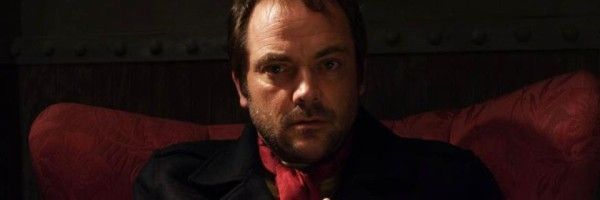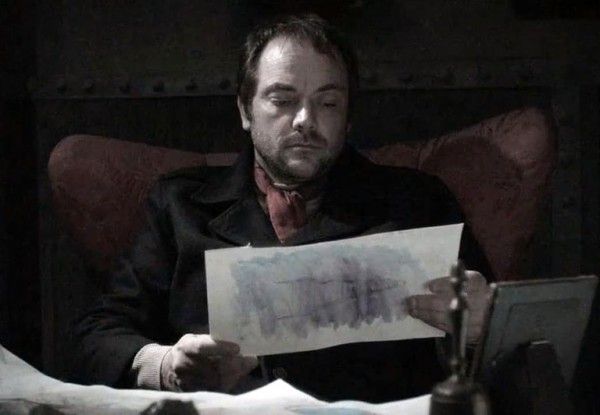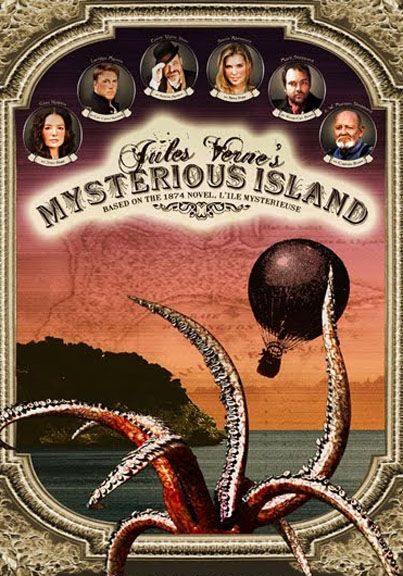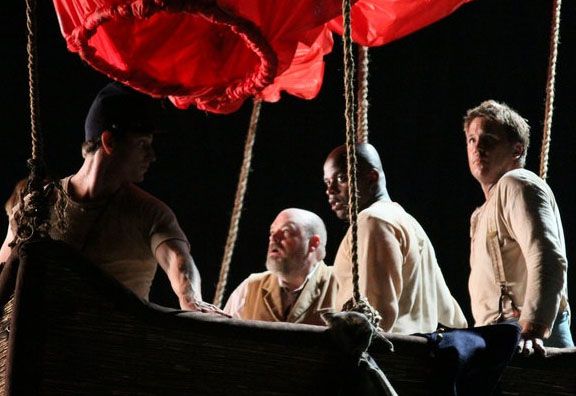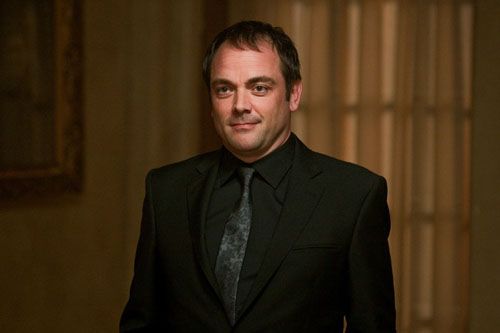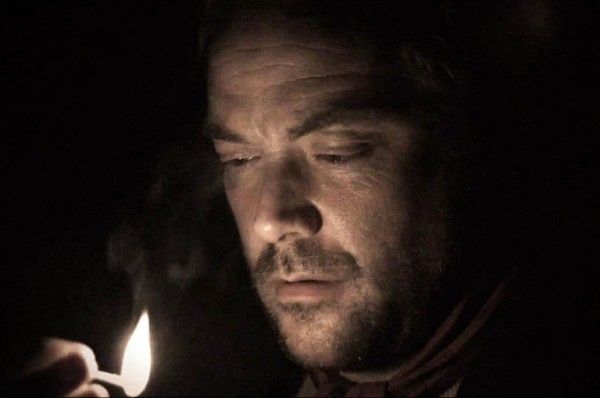The Syfy original movie Mysterious Island (premiering on February 11th) is adapted from Jules Verne’s 1874 novel. When five northern POWs from the American Civil War make the decision to escape by hijacking a hot air balloon, they wake to find themselves marooned on a desert island, inhabited by a cast of survivors who have been lost in space and time. Faced with defending themselves against vicious pirates, terrifying creatures and an active volcano that’s ready to blow, they must find a way to survive and escape the island before it claims them forever.
During this recent exclusive interview with Collider, actor Mark Sheppard, who is making his full-length feature directorial debut with the film, talked about how this project came about, the challenges of shooting in the weather and climate of the summer in Louisiana, getting creative to get what you want on a TV budget, and how he hopes that directing is something Syfy will let him do again. He also talked about having become something of a genre icon – with his work on Supernatural, Doctor Who, Warehouse13, Battlestar Galactica and Firefly, among others – and explained the fun he has in leaving his name out of the credits so that his return appearances are a surprise for the fans. Check out what he had to say after the jump:
Collider: How did this whole thing come about for you, as an actor and as a director?
MARK SHEPPARD: I’d worked with K2 Pictures – the production company with George [Kostuch] and Matt [Keith] – before on a film. I said, “If I was going to do a film, this is what I’d do,” and that turned into, “Okay, so let’s do one.” Part of the deal was to have me included in it, which was a lot of fun.
Was there something specific about this story that made you want to take this on for your full-length feature directorial debut?
SHEPPARD: Not really. I have always been a fan of the genre, and it’s always a fun thing and a challenge to take on a story, especially one that’s not necessarily been done so well, over the years. It’s a very difficult story to do, but we had a good go at it.
At any point, did you wish you’d taken on something easier, as a director?
SHEPPARD: It’s hard to tell a story because it’s so complex, in that amount of time, but the bottom line is that it’s entertainment. Hopefully, it’s somewhat true to the spirit of the story. There’s no way that you can film Mysterious Island in its entirety unless you do it as a mini-series because it is so difficult and so complex. It was an interesting exercise to see if I could execute it, and it came down to the logistics of it. When you’re shooting a movie that’s not necessarily a huge budget, you have to think about what you can leave out and still make it interesting. There’s never enough money and never enough time, in any of these projects, so you try your best to make the most enjoyable outcome that you can. I think we did a pretty good job. It was a lot of fun to do, but it was a tough story. There were some lovely people on the film. It was pretty ambitious, and I just hope people enjoy it. The thing about Jules Verne has always been that it was just about fantasy and great imagination, and I think we did pretty well with what we had.
What was it like to film this in Baton Rouge, Louisiana?
SHEPPARD: The flora and fauna were conspiring to kill me, all the way along, but it’s a great place to shoot. It’s got great people and great food. It was a lot of fun. I got to play with my dad (William Morgan Sheppard), Gina [Holden], Lochlyn [Munro], and just really good people. There are some fun performances in there. I think J.D. Evermore is lovely, and Pruitt [Taylor Vince] is always fun. There’s a lot of great stuff in it. It’s hard to do and, under the circumstances, it has to be a labor of love. It’s just impossible to do, otherwise. There is never enough time and there is never enough money to do it. Essentially, we shot this in a very, very brief period. I don’t think I’ve ever spent such little time on a film. And, I think it came out very well.
As a director, do you enjoy having to get creative with what you’re doing, in order to do what you want for the budget you have?
SHEPPARD: Absolutely! The job is the art of compromise. You say, “Well, I can’t do that and I can’t do that, so what can we do?” With the amount of time that I’ve spent on television with some extraordinary TV directors, over the years, I realized that I’ve been watching them for a really long time. I’ve been lucky enough to work with some of the best TV directors there are, and I’ve learned from how they had to handle when things don’t go quite according to plan.
We were in Louisiana in the summer, in 94 degrees with 98% humidity. Between the chiggers and everything else, I got eaten to death. I think I still have scars on my legs from making the movie. But, it was an amazing experience. The crew was extraordinary. Louisiana really has that. You’ve got a bunch of people down there who really work so hard. My grip crew and my electric crew were just extraordinary people.
There wasn’t anything these people wouldn’t do to try to make it work, and that’s a lovely feeling when you’re trying to make a film. Obviously, [Dave] McFarland is a wonderful, top-notch cinematographer. This was probably the smallest movie he’s ever shot. We threw caution to the wind and the motto for the movie was, “When in doubt, let’s just shoot Gina [Holden],” ‘cause she’s beautiful. So, it was a truly lovely experience and I shan’t forget it. I hope I get another chance to do it. Hopefully, it’s something that Syfy will let me do again.
Were any of the effects particularly challenging, or were they all challenging?
SHEPPARD: Scott Wheeler, who was the visual effects man on this piece, was fantastic. He was an amazing guy. The great asset we had was that Scotty was actually on set with us. I could literally turn around and go, “Well, I don’t have that and I don’t have that, but can I shoot that?,” and he’d go, “Yeah, that works.” That’s where it becomes a truly collaborative thing. Anybody that pretends making a movie is just one guy running around, shouting and telling people what to do, is an idiot. Scotty shot some B-roll and Second Unit stuff. He had his own RED down there as well, which really helped us. That meant, in post-production, he had a very good idea of what it was that I was trying to achieve.
Were there things that you learned from this experience, as a director, that will help you when you do it again?
SHEPPARD: Yeah, don’t shoot in the summer in Louisiana. Try to shoot towards the end of the summer, or preferably go for the winter. It’s damn hot and there’s stuff that tries to kill you. That was the first time I had ever seen locusts. What makes Louisiana so much fun is the people. The atmosphere and the vibe and the way that people are is just fantastic. All of my experiences in the south have pretty much been the same. It’s an incredibly hospitable place, in that way. There are really good people down there, who work really hard, doing what they do. There were a lot of people that worked really hard for very little money on this film, and I’m extremely appreciative. It was a great crew. You don’t last in low budget, if you’re not willing to work with people. It wasn’t a truly low budget film though, as it was quite a big endeavor. I’m very grateful to Syfy, which has been a really nice home for me, over the years, with the different shows and things that I have done. I’ve been on Syfy for a long time. It just felt really comfortable that they were the people that took it. Being back at Syfy is a good, fun thing.
Could you ever have imagined that you would become something of a genre icon, in your career?
SHEPPARD: I really haven’t designed it that way. What’s happened for me, and what’s been wonderful for me, is that there have been so many incredible writers that I’ve worked with, over the years, and that I still work with. I’ve worked with people like Ron Moore, Joss Whedon, John Rogers, Naren Shankar, Rene Echevarria, Michael Angeli, Michael Taylor, David Weddle, Bradley Thompson, Jack Kenny and all of the people over at Warehouse 13, and so many other people. There are some really brilliant writers out there, and they’ve been very good to me, over the years.
I think television is very much turning into a writer’s medium, in that way. Maybe that has been one of the reasons why I’ve done so much stuff. The people that I’ve worked with before have moved from show to show and sometimes decided to take me with them, which is a lovely thing. For example, David Eick took me from Battlestar Galactica to Bionic Woman. I’m truly grateful for these people. It’s a fabulous time to be an actor in a writer’s medium. I think some of the best writing there is isn’t so much in films anymore, as it actually is in television. The products that we most admire are cable TV shows.
I did Firefly and Battlestar, and I’ve ended up on Doctor Who, and all these shows that have such an amazing, intelligent, articulate fan base. Supernatural has just been so much fun to do, and [Crowley] is such a fun character to play. Some of the doors have definitely been opened up as a result of these wonderful gifts that I’ve been given by these great writers.
How great is it to get to be the guy on Supernatural who gets to show up, wreak havoc and be hilariously funny, and then leave again?
SHEPPARD: It is one of the best jobs ever! I am so grateful to Eric Kripke, and Sera [Gamble], Bob [Singer] and Phil [Sgriccia], and everybody over there. They are so good to me and they’ve just made it so much fun. It’s so great to be able to show up and Crowley away like crazy. With the boys (Jared Padalecki and Jensen Ackles), Jim [Beaver] and Misha [Collins], it’s such a ridiculously fun place to go to work. It’s a group of people, from top to bottom and in every single aspect of that set, who are truly lovely. I’ve been blessed, over the years, with crews like that. Battlestar and Firefly are truly legendary for that.
And, I’ve gotta give props to the crew in Louisiana for Mysterious Island. It’s a tough gig, to work that hard, in that kind of heat. In lower budget filmmaking, everything is a favor. You’re pushing everybody, all the time. You’re trying to get the best out of it that you can, and it has to be a labor of love, or you can’t get it done. There are so many favors that are pulled, and I appreciate it so much. So many people contributed to that film, and I think the efforts are astonishing. If they had just limited themselves to what they were asked to do, we wouldn’t have had the same film. People really went above and beyond, and I really appreciate that and will never forget it.
Have you given any thought about the type of project you’d like to direct next?
SHEPPARD: I’d like to do something a bit more gritty and industrial, and maybe a little bit more modern. I’d love to do some horror. The stuff that I love more than anything are the ‘70s thrillers and action pictures. That’s my favorite genre. The movies that are shot in that vein always excite me. But, comedy is always such a fun thing. As long as the story is good and there’s something interesting to do, then I’ll do it. If I’m lucky enough to get the kind of actors that I’ve had so far, it’s going to be a blast, no matter what.
Do you know what you’ll be doing next, as an actor?
SHEPPARD: I can’t tell you that. If I told you that, somebody would be trying to work out what it is that I’m doing. I’m actually at the stage where I can’t Tweet what I’m doing or where I’m going because somebody will try to figure out if I’m coming back to a show. I’ve tended to keep my name off the credits of shows, over the last couple of years. It is so much fun to do, but I think it makes my agents very nervous. They’re like, “You want to take no credit at all?,” and I’m like, “I think they know I’m there.” It’s been wonderful.
With Leverage and Supernatural, nobody is allowed to ask, but I always call and offer [to leave my name off]. Trying to preserve the story is so much better for the fans. Do you really want to see my name come up, when I’m only going to be in the last five minutes? I think it ruins it, if I’m only appearing at the end, as a surprise. It’s so much fun to do, and they’ve been very kind to me, in that way. I’ve been lucky enough that some of the roles that I’ve played have resonated to the point where they’ve returned and recurred, in that way. It’s a lovely thing, when that happens, but then you worry about ruining the plot, if anybody knows you’re coming. We try to protect it, as best we can, and it really is so much fun to do.
With the scene in the season finale of Leverage, if we hadn’t taken it off, it would have ruined that end shot. That reveal was just so much fun. Dean [Devlin] and I were giggling like idiots, knowing that that was going to be such a big surprise. Now that everybody knows that I do it, they’ll always be waiting to see whether I’m going to show up, on every show. Sometimes I fit into these people’s plans, and it’s a lovely feeling. I’m honored to be a part of it.

